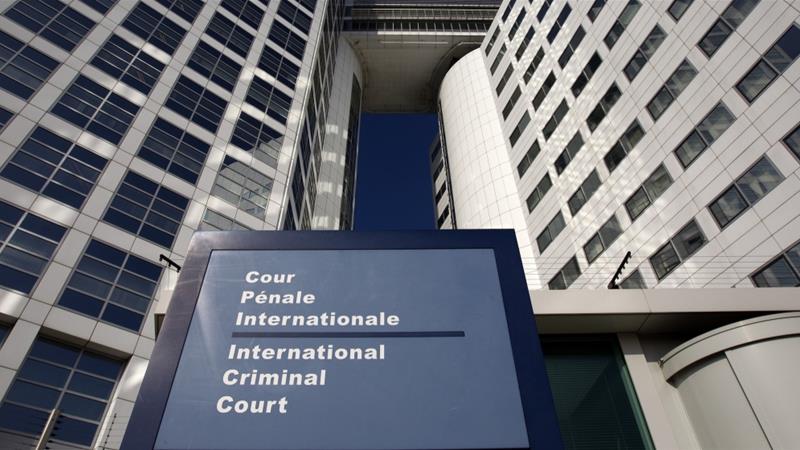The ICC Was Wrong to Deny Prosecution Request for Afghan Probe
SPOTLIGHT, ANGLO AMERICA, ASIA--PACIFIC, UNITED NATIONS, JUSTICE, MILITARISM, 22 Apr 2019
US officials will never end up before ICC judges, but speaking truth to power could still boost the court’s credibility.

The entrance of the International Criminal Court is seen in The Hague, March 3, 2011. [File: Reuters]
The judges ruled today that an investigation would not be in the “interests of justice”. This marks the first time that judges have invoked this argument, yet the ruling was meagre on its application, devoting just three and a half pages to the subject and, remarkably, not referencing any other cases or jurisprudence on the subject. Prosecutors will now appeal that decision and the court still has a chance to reverse course.
For some, however, the decision is a “good” one for the court. They believe that an investigation could only hurt the court because no American would ever end up before judges at the ICC. In denying the investigation, judges stated that changes in the “political landscape” in non-member states (ie the US) “make it extremely difficult to gauge the prospects of securing meaningful cooperation from relevant authorities for the future”. In short, they believed that an investigation would be too difficult to be worth trying, and therefore, not in the interests of justice or the court.
But they are wrong. A lack of cooperation from Washington or other states should not have prevented the ICC from investigating alleged atrocities in Afghanistan. Even without cooperation, such an investigation would likely bolster – not undermine – the court’s credibility.
The Waiting Game
That it took the ICC judges one and a half years to come to today’s decision will only increase speculation that they were acting politically, fearful of the political implications of an investigation and, possibly, Washington’s wrath.
At the same time, the ICC prosecutor’s office has been plagued by numerous high-profile setbacks. Within the last 12 months alone, judges acquitted both former Vice President of the Democratic Republic of the Congo Jean-Pierre Bemba and former President of Ivory Coast Laurent Gbagbo. It has also come to light that the ICC’s own president, Chile Eboe-Osuji, is suing the court for higher pay at a time when the institution is struggling to resource its current workload.
Against this backdrop, it is tempting to conclude that the ICC should be risk-averse, focusing only on suspects who are likely to be surrendered to the court. In line with such thinking, it would have been ill-advised for the ICC to investigate atrocities in Afghanistan as cooperation wouldn’t be forthcoming. Such is the advice of many observers of the ICC.
The Cooperation Game
Followers of the ICC have repeatedly pointed out that US cooperation with the court would cease if the ICC opened an investigation into Afghanistan. They insist that there “will be no cooperation from the Afghan government, the Taliban, or the US”. Moreover, without any prospects of a successful trial of US officials along with the cessation of cooperation, “[t]here would be significant cost to the ICC, for little gain”.
These fears were confirmed when US National Security Adviser John Bolton threatened the ICC and its staff with sanctions while declaring that the US would “use any means necessary to protect our citizens and those of our allies from unjust prosecution by this illegitimate court.” They were further corroborated when Washington revoked ICC Chief Prosecutor Fatou Bensouda’s entry visa to the US.
There is no reason to believe that the ICC could “win” any confrontation with the US. Washington has promised to pull out all the stops in an attempt to isolate the court. Any investigation into Afghanistan would preclude cooperation and there is a virtually no chance that US officials would end up facing judges at the ICC. As a result, many worry that an investigation would further sap the ICC’s already sagging credibility. They needn’t.
The Credibility Game
An organisation’s credibility is partly a measure of the gap between the expectations that people have of the institution and its actual performance. If the performance of an institution falls short of our expectations, its credibility will suffer. If expectations are met, or are even surpassed, an institution will experience a credibility boost.
So, what does this mean for the ICC?
In its other cases – say, Joseph Kony in northern Uganda or Omar al-Bashir in Sudan – the expectation has been that any warrant would be enforced so that they face justice in The Hague. The court’s credibility suffers precisely because neither has appeared before the ICC more than a decade after warrants were issued for their arrest. But that wouldn’t have happened with Afghanistan because those aren’t the expectations at play when it comes to alleged US crimes.
As observers rightly point out, no one reasonably expects the US to cooperate with an ICC probe into alleged crimes committed by its officials. No one. Therefore, if the court were to ever issue arrest warrants for a Dick Cheney or a George W Bush, no one would expect them to be surrendered to the ICC. The expectation will be that Washington vociferously defends its former political leaders while belligerently attacking the court at every opportunity.
US vitriol won’t fit the global narrative of an ineffectual ICC so much as the narrative of American exceptionalism and refusal to take responsibility for a government-planned and implemented era of torture. In the words of a former international judge, it will be “consistent with the new American line: ‘We are No 1 and we stand above the law’.”
The ICC versus the US would be a tale of David versus Goliath. But even if David misses with all of his stones, no one would blame him.
The End Game
The ICC has failed to meet many expectations. It hasn’t contributed to a spate of peace or reconciliation and it hasn’t held the worst mass murderers to account. And to be clear: unenforced arrest warrants can hurt the ICC’s credibility. But in this case, they wouldn’t.
The global community doesn’t judge the court merely on the basis of its legitimacy as a court, where surrenders and trials are of the essence. They judge it as an international organisation going where none has gone before: putting major powers on notice for their abuses. The inevitable tantrums that would follow any arrest warrants for US officials would only boost the perceived legitimacy of the court, especially among those who never expected that an international tribunal would ever confront American power.
No one believes that American officials will end up at the ICC. The assumption is that the ICC will wilt before American power. Many will see today’s decision as the judges proving them right. But if there is any chance, on appeal, for the court to reverse course, it should do so and surprise us – and exceed expectations.
______________________________________________________
More on ICC:
- ICC judges deny prosecution request for Afghan probe
- Malaysia backtracks on decision to join ICC
- US revokes ICC prosecutor’s entry visa over Afghanistan probe
- Philippines officially out of the International Criminal Court
Mark Kersten is a Fellow at the Munk School of Global Affairs, University of Toronto.
Go to Original – aljazeera.com
Tags: International Criminal Court ICC, Justice, Military, Military Intervention, Military Supremacy, NATO, Politics, Power, US Military, USA, Violence, War, War crimes
DISCLAIMER: The statements, views and opinions expressed in pieces republished here are solely those of the authors and do not necessarily represent those of TMS. In accordance with title 17 U.S.C. section 107, this material is distributed without profit to those who have expressed a prior interest in receiving the included information for research and educational purposes. TMS has no affiliation whatsoever with the originator of this article nor is TMS endorsed or sponsored by the originator. “GO TO ORIGINAL” links are provided as a convenience to our readers and allow for verification of authenticity. However, as originating pages are often updated by their originating host sites, the versions posted may not match the versions our readers view when clicking the “GO TO ORIGINAL” links. This site contains copyrighted material the use of which has not always been specifically authorized by the copyright owner. We are making such material available in our efforts to advance understanding of environmental, political, human rights, economic, democracy, scientific, and social justice issues, etc. We believe this constitutes a ‘fair use’ of any such copyrighted material as provided for in section 107 of the US Copyright Law. In accordance with Title 17 U.S.C. Section 107, the material on this site is distributed without profit to those who have expressed a prior interest in receiving the included information for research and educational purposes. For more information go to: http://www.law.cornell.edu/uscode/17/107.shtml. If you wish to use copyrighted material from this site for purposes of your own that go beyond ‘fair use’, you must obtain permission from the copyright owner.
Read more
Click here to go to the current weekly digest or pick another article:
SPOTLIGHT:
- How Trump Can Turn Back the Doomsday Clock
- Brazil-USA: A Tale of Two Caudillos
- Albert Einstein on Jews in Palestine
ANGLO AMERICA:
ASIA--PACIFIC:
- The Hawaiians Who Want Their Nation Back
- The Hidden Meaning of the Martial Law in South Korea
- The Machu Picchu Declaration of the Asia-Pacific Economic Cooperation-APEC 2024
UNITED NATIONS:
- Putin’s Proposed UN Control Over Ukraine Is Well Intentioned but Will Be Tough to Implement
- The Christian Zionist Leading the International Court of Justice
- UN Special Rapporteurs on Palestine Talk Truth to Power as Trump Takes Over the US Government
JUSTICE:
- Statement of the ICC Office of the Prosecutor on the Arrest of Former Philippine President Rodrigo Roa Duterte
- Ireland Formally Joins ICJ Genocide Case against Israel
- Good and Bad War Criminals
MILITARISM:
